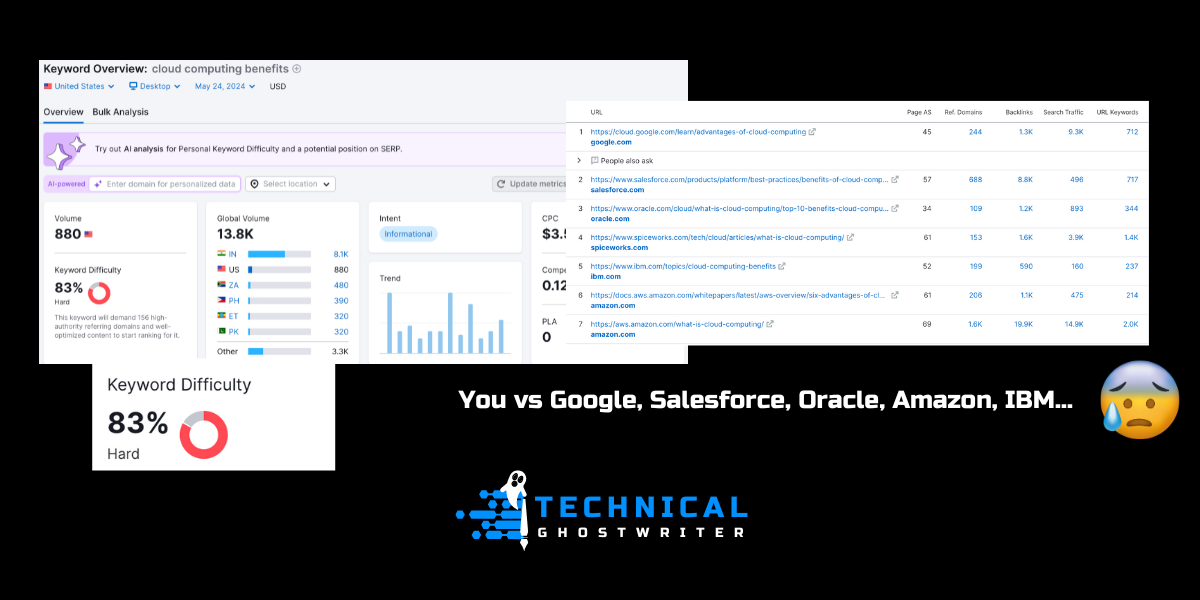Visibility is everything. Every day tech companies targeting developer personas are fighting for the top spot in search engine results, striving to catch the attention of potential customers and clients. Enter the SEO Technical Ghostwriter, a specialized role that combines the precision of technical writing with the strategic nuances of SEO. This article will delve into the process of becoming a successful SEO Technical Ghostwriter, focusing on the intricacies of crafting content that not only ranks high but also resonates with a technical audience. You thought it was difficult to become one? Once you have the required technical background, not so much!
Understanding the SEO Technical Ghostwriter Role
An SEO Technical Ghostwriter is a unique hybrid. This role demands the ability to understand complex technical concepts and translate them into engaging, accessible content that is optimized for search engines. Unlike a standard technical writer, an SEO Technical Ghostwriter must also have a deep understanding of keyword research, on-page SEO techniques, and content marketing strategies. The goal is to create content that not only educates and informs but also attracts and converts.
Also, unlike an SEO writer that is building brand beyond their content, Technical Ghostwriter just leaves the content under your own (or your brand’s) name. If you want to become one, you should feel comfortable with your work being signed by someone else.
The Importance of Keyword Research
Keyword research is the cornerstone of SEO. It involves identifying the terms and phrases that potential readers are searching for. This requires a blend of analytical skills and industry knowledge. Tools like Ahrefs, SEMrush, and Google Keyword Planner are indispensable for this task. These tools help in discovering high-volume, low-competition keywords that are relevant to the content being created. For instance, if you’re writing about cloud computing, you might find that “cloud computing benefits” or “cloud computing for beginners” are popular search terms. Focusing on these keywords might potentially bring you a lot of traffic. However, you will need to understand more concepts to see if it’s feasible to rank for these keywords, as the competition would be fierce:

While you may find a perspective of ranking for a keyword with 13.8k monthly searches appealing, this is a very hard keyword to rank for that would require not only amazing, unique and focused content, but also over 300 referring domains to link to your content. That’s a lot of quality backlinks out there, and quite expensive and time consuming to reach.
That’s not enough, even with your amazing content and 300 backlinks you may still not rank, as your competitors are among the highest authority sites in technical space.
If you have a client that wants to rank them and doesn’t, even with your content perfectly adapted to the queries, don’t worry. It’s not on you. It’s on a massive competitive difficulty this keyword has.
Crafting Engaging, SEO-Optimized Content
Creating content that appeals to both search engines and readers is truly an art. As an SEO Technical Ghostwriter, you need to strike a balance between technical accuracy and readability. This means constantly breaking down complex topics into digestible pieces of information and ensuring both flow and readability. Use headings and subheadings to structure your content, making it easy for readers to scan and find the information they need quickly. Each section should be clearly defined, with concise paragraphs that deliver value without overwhelming the reader.
Moreover, it’s crucial to write in a conversational tone. While maintaining professionalism, aim to make your content engaging and relatable. For instance, instead of saying, “The API integration process can be complex,” you might say, “API integration might seem daunting at first, but with the right steps, it becomes manageable.” This approach helps in making the content more approachable and less intimidating for readers.
Another important aspect on the “how” of your writing is the rise of AI. Is the content AI written? It might not be, but it can still feel like it is. In that case, you may want to “humanise” it a bit.
On-Page SEO Techniques
On-page SEO refers to the optimization of individual web pages to rank higher and earn more relevant traffic. This involves several key practices:
- Title Tags and Meta Descriptions: These are critical for search engine results pages (SERPs). Your title tag should be concise, include your main keyword, and be enticing enough to encourage clicks. The meta description, while not a direct ranking factor, significantly impacts click-through rates. It should provide a brief summary of the content, including relevant keywords. I usually propose meta description to my clients based on analysis of the existing content that ranks and finding an appealing combination. You may do that as well!
- Header Tags (H1, H2, H3, etc.): Use header tags to structure your content logically. The H1 tag should contain the main keyword and clearly convey the topic of the page. Subsequent headers (H2, H3) help break down the content into readable sections and should also include relevant keywords where appropriate. Your core keyword should be repeated and relevant keywords from the same cluster should be present in the content.
- Internal Linking: Guide readers through your site by linking to other relevant pages. This not only helps keep readers engaged but also distributes link equity across your site, which can improve your overall SEO performance.
- Alt Text for Images: Always include descriptive alt text for images. This not only helps with accessibility but also gives search engines more context about your content.
The Power of High-Quality Backlinks
Backlinks, or inbound links from other websites, are a significant factor in SEO. They act as endorsements from other sites, signaling to search engines that your content is valuable and trustworthy. As an SEO Technical Ghostwriter, part of your role is to create content that others want to link to. This means producing high-quality, authoritative content that stands out in your industry.
Engage in outreach to get your content noticed by influencers and bloggers who can provide valuable backlinks.
Finally: Writing for Different Types of Queries
Navigational Queries
Navigational queries are performed when users are looking for a specific website or page. For instance, a user might search for “Slack login” or “JIRA documentation.” As an SEO Technical Ghostwriter, you need to ensure that your content is optimized to capture these queries, but only if you’re writing for these companies. Google is smart and very good at finding relevant information that user needs. Make sure that the content is unique for the piece that you do and see what else is ranking there. Meta description should clearly differentiate the new content from the other, so that the users can find the docs they need as fast as possible.
Remember: with navigational queries, you’re going to mostly competing with yourself. Make sure the focus is to make the user experience as smooth as possible.

Informational Queries
Informational queries are made when users seek knowledge or answers to specific questions. These queries often start with “how,” “what,” or “why.” For example, “how to start using image hosting” or “what is machine learning.” Content targeting these queries should be detailed, well-researched, and written in a natural, engaging tone. This is where you need to remember the other rule, and be as specific as possible:

Use long-tail keywords and provide thorough, specific and neutral answers that establish your content as a reliable source of information. Incorporate internal links to related content, guiding users deeper into your site.
Conclusion
Becoming an effective SEO Technical Ghostwriter requires a blend of technical knowledge, writing prowess, and SEO expertise. By mastering keyword research, crafting engaging content, employing on-page SEO techniques, and understanding the nuances of different query types, you can create content that not only ranks high in search results but also resonates with your audience.
Remember, the goal is to produce content that is both informative and accessible, guiding readers seamlessly through their search journey. Docs and Guides and Blogs? Completely different stories, but you need to adapt the SEO know-how to draft content for each one of these that, above all, answers to what the user wants for each stage of the journey.

